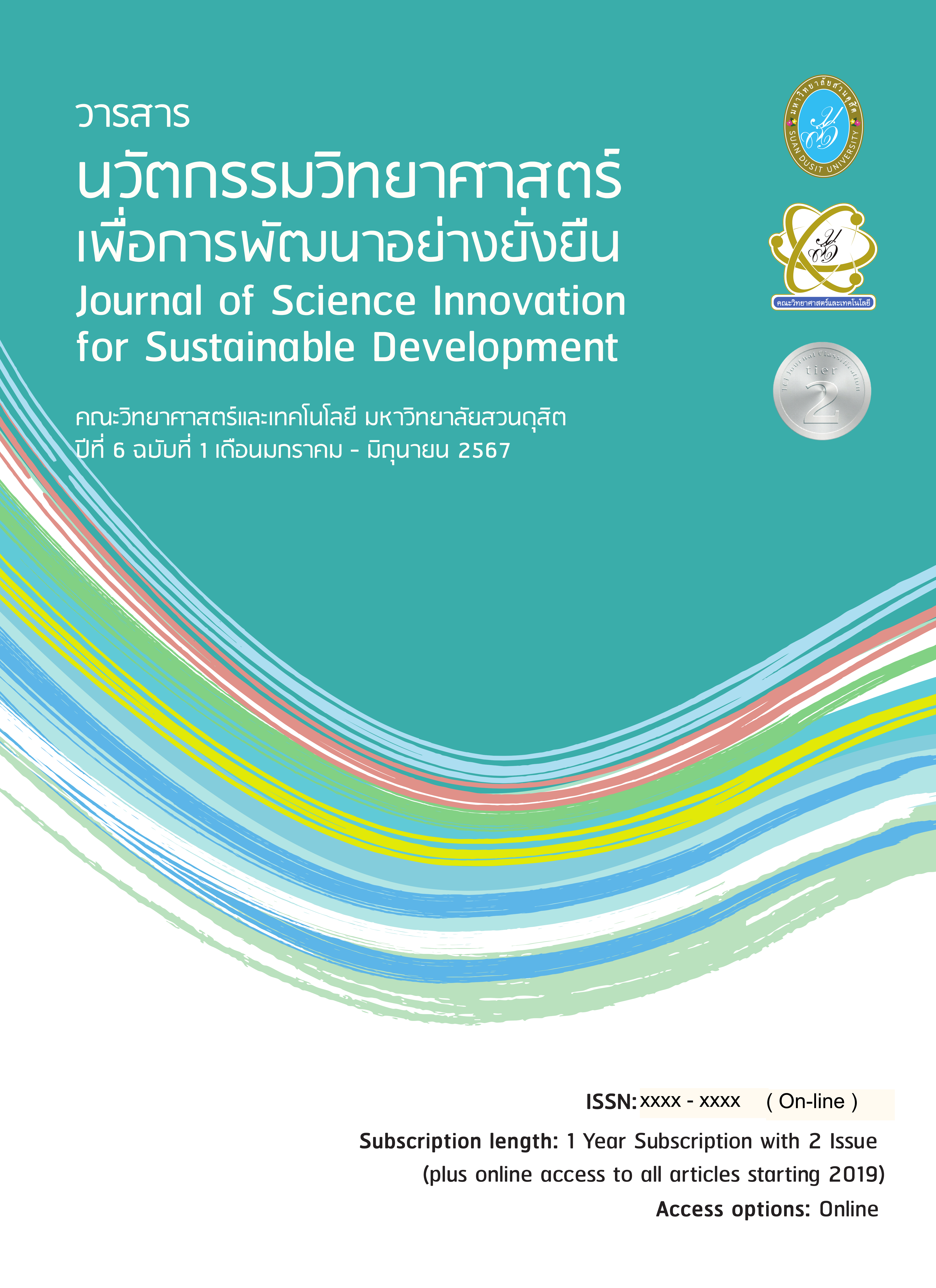Education Management of Science and Technology in Response to Current Scientific Needs ศ.ดร.ศุภชัย ปทุมนากุล1, รศ.ดร.ศิโรจน์ ผลพันธิน2, ดร.สุวมาลย์ ม่วงประเสริฐ2, จิร์ยาภรณ์ ศรีบุญรอด2 และ ผศ.ดร.สุภาภรณ์ ตั้งดำเนินสวัสดิ์2*
Main Article Content
Abstract
This academic article aims to present the necessity of science and the adjustment of the role of science and technology in education management through a case study at the Faculty of Science and Technology, Suan Dusit University. When production is no longer just the production of tangible products. Changes in consumer demand, product nature, production economics, and the economics of supply chains have led to fundamental changes in the way business is done. Consumers want privacy and personalization of products and services. In order to minimize blurring between producers and consumers. Manufacturers have come in to turn unintelligent products into intelligent ones. Manufacturers have built a vast number of products and services into the platform's operating system. The advancement of technology is boundless. The barriers to entry, commerce, and learning are eliminated. The manufacturer creates an innovative production model. Changes bring challenges to the transformation of higher education institutions in workforce development and building excellence. Management of education to truly meet the needs of the country's development for the creation and development of a high-performing workforce and be able to produce graduates to work quickly and efficiently.
Article Details

This work is licensed under a Creative Commons Attribution-NonCommercial-NoDerivatives 4.0 International License.
ลิขสิทธิ์ต้นฉบับที่ได้รับการตีพิมพ์ในวารสารนวัตกรรมวิทยาศาสตร์เพื่อการพัฒนาอย่างยั่งยืนถือเป็นกรรมสิทธิ์ของคณะวิทยาศาสตร์และเทคโนโลยี มหาวิทยาลัยสวนดุสิต ห้ามผู้ใดนำข้อความทั้งหมดหรือบางส่วนไปพิมพ์ซ้ำ เว้นแต่จะได้รับอนุญาตอย่างเป็นลายลักษณ์อักษรจากคณะวิทยาศาสตร์และเทคโนโลยี มหาวิทยาลัยสวนดุสิต นอกจากนี้ เนื้อหาที่ปรากฎในบทความเป็นความรับผิดชอบของผู้เขียน ทั้งนี้ไม่รวมความผิดพลาดอันเกิดจากเทคนิคการพิมพ์
References
ศุภชัย ปทุมนากุล. (2566). ความจำเป็นด้านวิทยาศาสตร์กับการปรับบทบาทของการจัดการศึกษาด้านวิทยาศาสตร์
และเทคโนโลยี. เอกสารประกอบการบรรยาย โครงการอบรมให้ความรู้เพื่อพัฒนาการ ดำเนินงานของหลักสูตร มหาวิทยาลัยสวนดุสิต วันจันทร์ที่ 3 เมษายน 2566 ณ ห้องประชุมลำพอง 2 และระบบ Zoom Meeting Application.
สภาอุตสาหกรรมแห่งประเทศไทย. (2565). เกรียงไกร เธียรนุกุล ประธานสภาอุตสาหกรรมฯ วาระปี 2565-2567
ชูวิสัยทัศน์ “Strengthen Thai Industries for Stronger Thailand เสริมสร้างความ แข็งแกร่งให้อุตสาหกรรมไทย เพื่อประเทศไทยที่เข้มแข็งกว่าเดิม”. สืบค้นเมื่อ 5 เมษายน 2565, สืบค้นจากhttps://fti.or.th/2022/04/23/.
สำนักงานคณะกรรมการนโยบายวิทยาศาสตร์ เทคโนโลยีและนวัตกรรมแห่งชาติ. (2566). ส่อง 6 หลักสูตร Sandbox
ล่าสุด! พร้อมปั้นกำลังคน ตอบโจทย์ประเทศ. สืบค้นเมื่อ 5 เมษายน 2565, สืบค้นจาก https://www.
nxpo.or.th/th/15515/.
สำนักงานพัฒนาวิทยาศาสตร์และเทคโนโลยีแห่งชาติ. (2560). อุตสาหกรรม 4.0 (Industry 4.0) แนวทางของ
อุตสาหกรรมแห่งอนาคต. สืบค้นเมื่อ 5 เมษายน 2565, สืบค้นจากhttps://www.nstda.or.th/
home/knowledge_post/industry-4-0/.
สำนักงานสภาพัฒนาการเศรษฐกิจและสังคมแห่งชาติ. (2565). แผนพัฒนาเศรษฐกิจและสังคมแห่งชาติ ฉบับที่ 13
(พ.ศ. 2566-2570). ราชกิจจานุเบกษา เล่ม 139 ตอนพิเศษ 258 ง วันที่ 1 พฤศจิกายน 2565. สำนักนายกรัฐมนตรี.
สุวมาลย์ ม่วงประเสริฐ, ศิโรจน์ ผลพันธิน, สุภาภรณ์ ตั้งดำเนินสวัสดิ์, และจิร์ยาภรณ์ ศรีบุญรอด. (2565).
ปัจจัยที่ส่งผลต่อประสิทธิภาพและประสิทธิผลการเรียนการสอนออนไลน์ในระดับอุดมศึกษา. วารสารวิชาการบัณฑิตวิทยาลัยสวนดุสิต. ปีที่ 18 ฉบับที 3: กันยายน - ธันวาคม 2565, หน้า 73-88.
Deloitte University Press. (2015). The Future of Manufacturing: Making Things in a Changing World.
A Report in the Future of the Business Landscape Series. Retrieved April 5, 2023 from https://www2.deloitte.com/content/dam/Deloitte/za/Documents/manufacturing/ZA_Future_of_Manufacturing_2015.pdf.
McKinsey Global Institute. (2017). A Future That Works: In Thailand, Technology and Automation areAffecting Core Sectors. Retrieved April 5, 2023 from https://www.mckinsey.com/~/media/
mckinsey/featured%20insights/digital%20disruption/harnessing%20automation%20for%20a%20future%20that%20works/mgi-a-future-that-works_full-report.pdf


